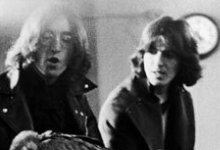
Tracks
The Beatles: "Revolution 1 (Take 20)"
Unreleased (2009)
By Joel Elliott | 9 March 2009
“Revolution 9” gets all the bad rap, but it’s “Revolution 1” that’s always irritated me: the Beatles’ one chance to get political as a band, it ended up coming across more as a patronizing disavowal of any application of the peace and love of the ’60s to something more concrete than a tab of acid. I’ve always wondered if “Revolution 9”—a fascinating if confounding piece of tape art that only bears the status of arty indulgence because it was the fucking Beatles and not, say, Karlheinz Stockhausen—was proof that the song was tongue-in-cheek. Perhaps Lennon’s political views were radically altered in the ensuing few years, but I’m guessing either way he felt a bit of a cringe when hearing that “It’s Gonna Be Alright” outro a few years later facing his own private war against Nixon.
If it was a joke it was hard to piece together, but maybe that was the point: like a spoof of an old black-and-white film that starts out with a civilized upper-crust function, cuts to a “Missing Reel” message, then ends with the party disintegrated into disorder and anarchy. Were the Beatles trying to sabotage their own innate sense of British decency? Was Yoko Ono? At any rate, the recently unearthed “Revolution 1 (Take 20)” attempts to link the two tracks, taking the original and extending it to nearly 11 minutes, with it gradually spiraling into improvised studio tricks. As if in recognition of the self-sabotage or profound tension between the members, the track starts out with the studio banter being periodically silenced by somebody (Ringo?).
As an historical artifact, if not an actual “New Beatles song,” this new take is outstanding. It reflects several things: 1) the Beatles were a band fundamentally at odds with itself; 2) experimentation and a dearth of ideas go hand-in-hand; 3) the band could shit and it would still be called a “Holy Grail”; 4) “experimental” music is just pop that’s allowed to go on longer than it should. This is all interesting, and the guitar effects sound great, even if the song is still fundamentally annoying. This really shouldn’t matter for a track that manages to fully embody the idea that the band simultaneously mastered and destroyed the modern pop song.





